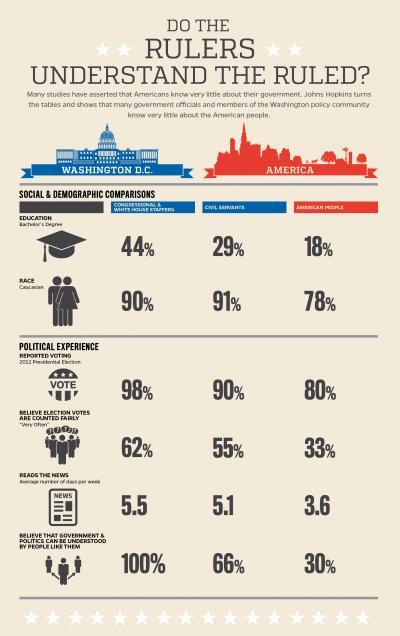In the modern era, a great deal of policy decisions are made by people who do not report to the public. If the EPA agrees to settle a lawsuit with canoers by calling water a pollutant, they can just do it, and stick local government with a $500 million liability.
From the post office to the agencies that fund science, a new examination has found what most people know; that unelected officials have little understanding of the people they indirectly rule. Johns Hopkins University political scientists - ironically, humanities academics did a study to find out if another group was out of touch with mainstream thinking - surveyed 850 people who either work in the federal government or directly with it and found that this inside-the-Beltway crowd has very little in common with America at-large.
Career Washington insiders are more likely to be white, they are almost twice as likely to be Democrats, and like all government employees their salaries are higher than the average employee in the private sector. Most surprising is that they think the mechanics of government are easy to comprehend.

This is a summary of some of the findings of a comparison of Washington insiders and the American people as a whole. Credit: Jennifer Bachner and Benjamin Ginsberg/JHU
"The elements of difference we have identified between the rulers and the ruled — demographic, experiential, partisan and ideological — give us some reason to suspect that the two groups may not perceive the political world in the same way," Jennifer Bachner and Benjamin Ginsberg write. "Taken together, these elements could well create a substantial cognitive and perceptual gulf between official and quasi-official Washington on the one hand and the American public on the other."
Bachner and Ginsberg asked hundreds of questions in 2013 of those who work in federal agencies, on Capitol Hill and in other Washington policy jobs. Americans and federal workers couldn't be more different, they found:
91 percent of those who work for federal agencies are white, and in 2012, federal worker compensation averaged $81,704, or 48 percent more than the private sector average of $54,995, according to the U.S. Bureau of Economic Analysis. That puts federal workers in the top 10 percent of American earners.
60 percent of those who work on the Hill are Democrats versus 35 percent of Americans at large. In the 2012 presidential election, 97 percent of congressional and White House staffers voted versus 80 percent of other Americans. 62 percent of those Hill staffers believe election votes are counted fairly "very often" compared with 33 percent of other Americans.
Washingtonians read the news at least five days a week compared with about three days a week for the rest of the country.
And while 100 percent of congressional and White House staffers believe government and politics can be understood by people like them, only 30 percent of regular Americans feel that way. The data on "average Americans" was largely drawn from the 2012 American National Election Study.
All told, Bachner and Ginsberg found, if random Americans were dropped into the offices of a Washington administrative agency or into a lunch at a Washington power restaurant, it would feel and sound to them like another planet. These crucial differences, the researchers say, lead to entirely divergent philosophies on policies, priorities and government's ultimate purpose.
"Official Washington views the public through jaundiced eyes, believing that ordinary Americans are uninformed and misguided and that policymakers should ignore them," Ginsberg says. "The government's lack of trust in the people reflects the civic distance between the American people and their government as much as any political reality. Nevertheless, what the government thinks of the people affects how it governs, especially the chance that policy will be influenced by citizen preferences."
"Some say American democracy would be strengthened if the people received better civic education," Ginsberg continues. "We argue that it is America's governing elite that needs civic education, focusing on the responsibilities of officials in a democracy."






Comments